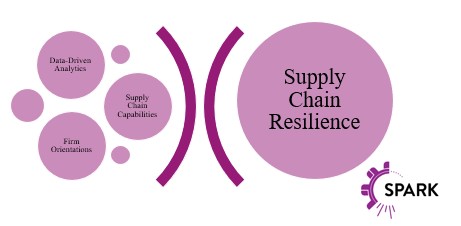ReDSe- Responsive Data-driven Servitization
Facts
Academic Partner: Jönköping University
Industrial Partners: Husqvarna,
Combitech, Fagerhults Belysning, Siemens Energy External link, opens in new window., Saab Training & Simulation to Industrial Partners
Financier: KK-stiftelsen
Duration of the project: 2021-2022
Research team:


Contemporary supply chains struggle with matching supply and demand, especially, given the challenges put forward by disruptions. To what extent can data-driven analytics be used to build resilience and responsiveness in supply chains?
Introduction
While over the past decades much scientific and practical attention has been dedicated to the implications of globalization, the recent disruptions resulting from the Covid-19 pandemic once again underlined the fragility and complexity of global supply chains.
In building supply chain resilience, firms can capitalize on modern data-driven analytics tools as well as on a range of supply chain capabilities, including visibility and integration. Moreover, building a culture of relying on such tools in supporting decision-making can be influential. While the antecedents and contingents of supply chain resilience have been studied in earlier contributions, the interplay of them is a missing link.
This project serves to address this issue by taking a configurational approach. In this regard, empirical data will be collected by means of surveys targeting informant decision-makers in Swedish manufacturing and retailing firms.

ReDSe is one of several projects within the framework of the research profile AFAIR, which has been developed in collaboration with industry to integrate technical, logistical and organizational aspects of the introduction of AI
Purpose
The purpose of this study is to explore the application of data-driven analytics in relation to supply chain resilience. Specifically, the project seeks to shed light on the prospects of using data-driven analytics in supply chains across various industries (e.g., manufacturing and retailing). Also, the different configurations resulting from applying data-driven analytics, supply chain capabilities, and firm orientations will be explored. Finally, it is investigated as to whether the resulting configurations are associated with different levels of supply chain resilience.
Expected results
Configurational perspectives on industrial practice contend that there is no magic bullet for outperforming competition which could apply to all firms. Therefore, identifying constellations of firms with similar practices in applying data-driven analytics, which are uniquely different, could help understand how different practices can lead to different levels of supply chain resilience.
The results of the multi-industry-wide study could provide insights for decision-makers regarding competitive positioning, as well as the relevance of data-driven analytics in building supply chain resilience. This analysis could lead to identifying and developing suitable business cases which could be rewarding for decision-makers.
For more information
- Associate Professor Operations and Supply Chain Management
- School of Engineering
- hamid.jafari@ju.se
- +46 36-10 1864



